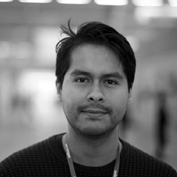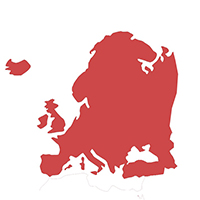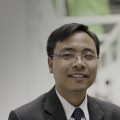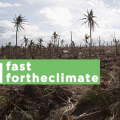Walking Through Paris: An Interview With Yeb Saño
Juan Mayorga | December 10, 2015.
It’s been two years since Yeb Saño delivered the emotional speech in Warsaw that made him as someone to watch during the UN climate change negotiations. At the very moment when super typhoon Haiyan was ripping through the coastline of Tacloban in his home country of the Philippines, Saño gave a powerful address, in which he dared climate deniers to resist action, and gained the attention of the world.
Back then, he wore suit and tie to address the climate negotiators, but two years later at COP21 in Paris, he is dressed cargo pants and hiking boots. The outfit is a reminder of the 1,500 kilometre walk Saño led from Rome to Paris to raise awareness of the climate climate crisis.
A dozen people accompanied Saño on the journey, singing and clapping throughout the conference centre to communicate the message of the People’s Pilgrimage: a message of faith that transcends language.
Since Saño left his job as climate change commissioner in the Philippines, he has become increasingly outspoken on climate change urging people to look at the ethics of the global problem. As he moved through Italy, Switzerland and France—a route that involved crossing the Alps during the early winter—he completed the final phase of a pilgrimage that started last April in Manila. Along the way Saño passed through Vanuatu, Korea, Thailand, Indonesia, the Great Barrier Reef in Australia, India, Africa and the Americas.
In the middle of a break in his crowded speaking schedule, Saño spoke to The Verb about the moral and religious relevance on the UN climate convention process.
***
Juan: What is the role of faith in these negotiations?
Yeb: Around a process like this, countries are represented by governments, most of whom really don’t speak for their people. And it all has become really technical about the words that come into the agreement.
We don’t know whether the prayers all over the world and the faith actions that had happened would influence the outcome, but what we always said on this journey was that the journey does not end in Paris. We are just walking through Paris and, as such, we should not have the illusion that the work that we have done will change the way things happen in a single conference.
“We need to continue working even after Paris and build those communities.”
The role of faith groups and faith communities, and in general the role of our respective individual faith practices is to hold on to something that is good, and spread love and sincerity in our everyday lives. That can really create a lot of change.
The Philippines has led very ambitiously. What can we learn from them?
The Philippines really stands to lose a lot and has a big stake in this whole process of crafting an agreement on climate change.
“We are really experiencing the brunt of the impact of climate change together with other communities in small island states and poorer countries.”
It’s a big challenge for us, that’s why we are very serious about this. You see us both inside and outside, really working hard to get something done.
What was the message of your walk?
Reflecting on our journey and on the process and the overall big picture where we confront climate change as a whole human family. It is important for us to realise that every step counts. It started literally on a long walk like the one we did from Rome to Paris, but every step counts in solving climate change. Let us continue to believe that humanity will find a way.
In our everyday lives whether individuals, communities or entire cities, and hopefully even nations, just do even little things that contribute towards a bigger thing. It can really confront the climate crisis and address the climate change in a very big way. That has been our message and it carries with it a message of hope for all of us.
“Despite our governments we are still hopeful.”
Climate change is a problem that our children will inherit, and they deserve better. And this is the last generation that can do something about it.
***














comment